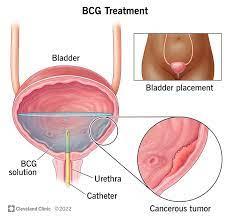Bladder cancer is one of the most severe health problems on a global level, with it being diagnosed thousands of times each year in various populations. Firstly, the BCG cure, a source of treatment that caused a high rate of fatality, played the biggest role in the fight against this disease. In this blog from the best ayurvedic cancer hospital in Delhi, we will explore the mode of action, achievements, and expected side effects of BCG when assigned as a treatment for bladder cancer.
Understanding Bladder Cancer
The disease itself should be well understood because not only does bladder cancer take place before BCG therapy is started. Normally, benign tumors emerge from the cells of the bladder wall at the far end. There are two types: transitional cell carcinoma, squamous cell carcinoma, and adenocarcinoma.
BCG Therapy: A Brief Overview
The Bacillus Calmette-Guérin therapy technique (BCG) is the treatment of bladder cancer through a process that continues to be a revolutionary procedure worldwide. This kind of therapy is obtained from a devitalized version of Mycobacterium bovis, which is very closely related to the bacteria that causes tuberculosis. BCG therapy, based on immunological procedures, involves applying the immune system's strength to kill malignant cells inside the bladder.
Administration
In a BCG treatment, patients are given the vaccine through the catheter into the bladder itself. This method of application enables strong contact of the BCG solution with the bladder lining, which is where the majority of cancer cells aggregate. The procedure is usually done in a medical center by a qualified healthcare specialist.
Stimulation of the Immune Response
With the aim of tackling the immune system, BCG starts the immunological chain reaction within the bladder. However, the exact mechanisms of BCG action still need to be clearly understood. It is believed that BCG triggers different components of the immune system, mainly the mucosa of the bladder.
Activation of Immune Cells
One of the most important effects of BCG injection is the maturation of the immune cells within the bladder epithelium. Macrophage, a white blood cell, occupies the leading position, known as the cleanup crew. After BCG exposure, macrophages become activated, and they take in cancer cells, effectively getting them out of the bladder.
Besides macrophages, BCG therapy affects T cells and natural killer cell activities. These immune cells infuse action; they are in charge of recognizing the cancer cells that initiate the infections within the bladder and taking them off, giving boots to internal body defense.
Induction of Inflammatory Response
One more benefit of BCG treatment is that it elicits an inflammatory reaction inside the bladder. This puffiness is one of the negative factors that may then lead to the destruction of the cell lines; it's because the latter is forced to thrive in the harsh environment created by the former. The inflammatory side of the tumor microenvironment may attract immune cells to the tumor site, thus further enhancing the anti-cancer immune response.
How BCG Works
The BCG vaccine nowadays is given in the form of an injection that is administered through a catheter into the bladder. When one has been taken into the body, BCG will stimulate the body's defensive system, which is essential for the bladder. The manner in which this inhibition is achieved is not yet understood, but the BCG immunization most probably results in some immune response that, in turn, gets activated against the masked cancer cells.
A sort of immune reaction to BCG is the activation of different immune cells: macrophages, T cells, and natural killer cells. These cells, as a team, can screen off and destroy the cancerous cells within the bladder. In addition to that, the BCG therapy may also cause an inflammatory reaction, which will, in turn, facilitate the removal of the cancer cells.
Effectiveness of BCG Therapy
BCG therapy has been proven to have high efficacy in terms of eliminating the risk of bladder cancer complications and progression to the next stage. Multiple clinical trials have revealed its efficiency, with a plan to focus on NMIBC patients in particular. It is even more true that BCG therapy is the most effective treatment for patients with high-risk NMIBC.
Yet, besides the patients who submitted to drugs to help them, there is another section of responders to treatment. Some aspects that may influence treatment success are the stage and aggressiveness of the cancer. When BCG therapy is not effective or bladder cancer recurs after treatment, there are additional treatments available.
Side Effects and Risks
Although the general tolerance of BCG injection therapy is very common, the side effects might be seen in some patients. Common symptoms are burning, irritation, and pain while urinating, as well as the sensation of having to urinate too often or too soon. In addition, some patients may have flu-like symptoms, such as fever, chills, and fatigue, after BCG treatment.
In severe cases, side effects such as cystitis, urinary tract infections, or disseminated BCG infections might happen as well. A follow-up of patients who are BCG-treated is necessary for issues of infection or other complications.
Conclusion
BCG therapy has been the key to the treatment of bladder cancer, as it is a very effective and minimally invasive method for many patients, says top doctors from the best ayurvedic cancer hospital in Mumbai. This is the concept of BCG immunotherapy, which leads to the deactivation of the cancer cells through the immune system and helps in preventing the recurrence of the disease and cancer progression, thus improving the outcomes of bladder cancer individuals. In spite of the fact that some of their side effects might occur, the advantages of BCG in therapy remain considerably greater than the risks, thus allowing it to be an efficient weapon against bladder cancer.


